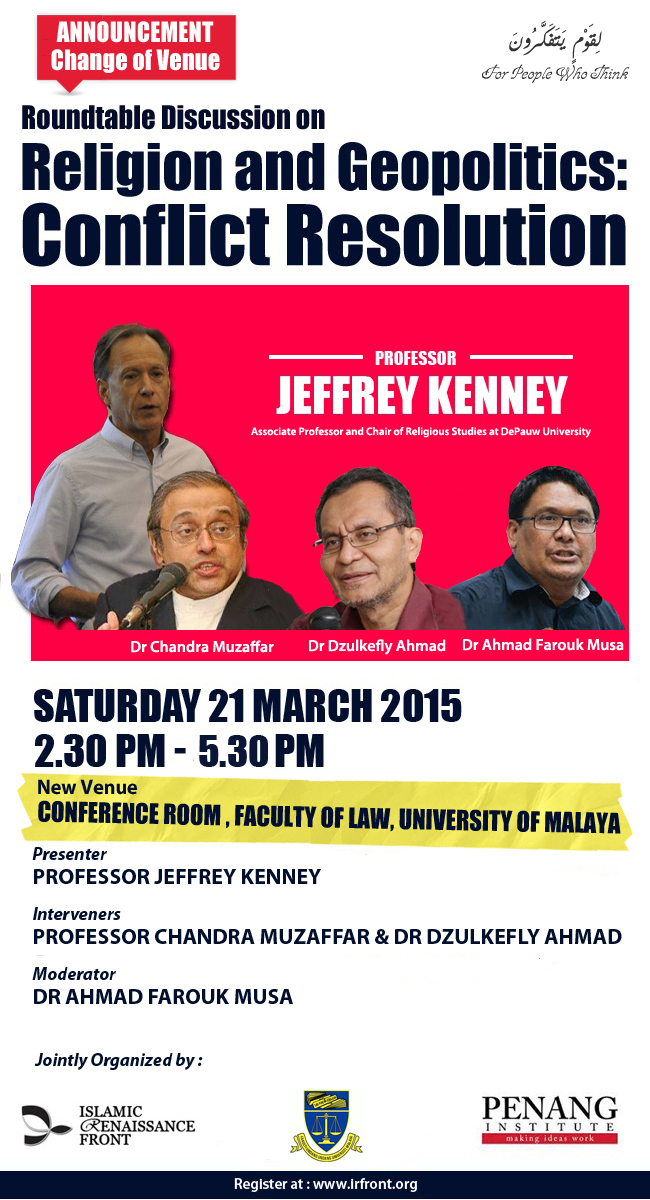
Date: Saturday, 21st March 2015
Time: 230PM – 530PM
Venue: Conference Room, Faculty of Law, University of Malaya, Kuala Lumpur
Registration: https://www.eventbrite.com/e/roundtable-discussion-on-religion-and-geopolitics-conflict-resolution-tickets-16027584938
The importance of religious terrorism in contemporary geopolitics has forced policymakers and academics to rethink the taken-for-granted understanding of geopolitics as interstate politics. Geopolitics perhaps offers as a framework to understand the world in its complexity as a pathway to try and explore and empathize with the diversity of political contexts and actors across the world.
Geopolitics is about the exercise of power. It is about geography. It is about actions. It is about how we portray, or represent, those actions. It is about how the powerful have created worlds. It is about how the weaker have resisted such efforts and, in some contexts, partially constructed their own worlds. It is about a multitude of connected actions and actors and the geographies they make, change, destroy and maintain.
In debating the issues relating to religion and geopolitics, current political thinkers have questioned the granted assumptions about Islam, the Middle-East, and the people that populate them; that have somehow justify military action and other foreign policy agendas. This has somehow motivated some marginalized or oppressed group, for perhaps the real motivation for “terrorism” is perceived political injustices.
Of course, religious terrorism is not strictly peculiar of Islam, for Christian, Jewish, Sikh and Buddhist are all tainted by groups who utilize a fundamentalist view of the belief system, to justify the act of terrorism. In other words, religious terrorism is a contemporary global phenomenon, and not related to one particular religion, as politically motivated claims against Islam suggest. It is perhaps true that religious terrorists are fighting a “cosmic war”; a war of good against evil, in which the adjudicator is God and the terrorists are merely the soldiers conducting God’s will. The battle is of a spiritual nature, and the victims are infidels or sinners, whose death will, in the minds of the terrorists, please God.
Currently, religious terrorism is creating a geography where state plays a less central role. Resort to the scale of “cosmic war” makes religious terrorists less chained to the authorities and constraints that exist when the state is seen as the key geopolitical structure. This new geography of structure and agency has implications for the severity of terrorists act and the possibilities for the conflict resolution. Hence this forum will discuss this complex matrix of religion and geopolitics, and its perceived ramifications.
Programs
230-300PM: Registration
300-305PM: Introduction by Moderator, Dr Ahmad Farouk Musa
305-315PM: Welcoming speech by Dr Azmi Sharom, Faculty of Law, University of Malaya
315-325PM: Opening speech by YB Zairil Khir Johari, Executive Director of Penang Institute
325-400PM: Speech by Prof Jeffrey Kenney, Professor of Religious Studies, Depaw University, Indiana, US
400-415PM: Intervener 1: Prof Chandra Muzaffar
415-430PM: Intervener 2: Dr Dzulkefly Ahmad
430-530PM: Discussion
530PM: Tea

